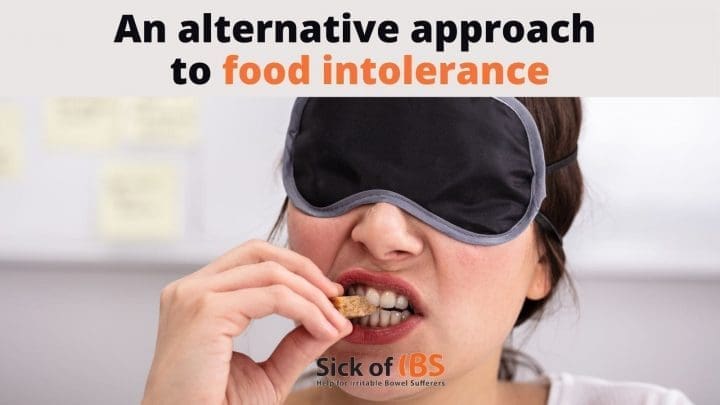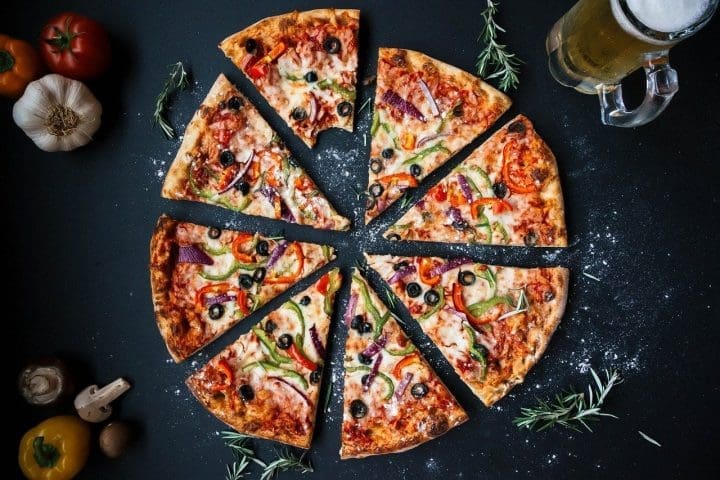
Do you get the impression there’s something you’re missing about IBS and food? You’re intolerant to the foods you love – and whatever you do, you never seem to really master your diet and your IBS symptoms?
If so, this week’s article will present you with a radically new approach food intolerance.
The traditional approach to food intolerance
Traditionally we are told that food intolerance works like this:
- You eat the “wrong” foods
- You mess up your microbiome (and get Candida, SIBO, H Pylori or leaky gut)
- This creates food intolerance, and you have to steer clear of the foods that trigger you.
[In other words you can be given the impression that it’s all your fault!]
The trouble is, you can BET that some of your favourite foods are the ones you have to avoid.

Your relationship with IBS and particularly with food has probably become really tense.
Mealtimes can become a battlefield.
You do your very best to work out what you can eat.
Trouble is that from time to time you find that there’s something else you start digesting badly. And it’s all so unclear!
You can be really “good” and eat the bland boring food, and still have an unexpected flare-up!
That’s downright maddening.
Why you are intolerant to the foods you love

Are you hungry for a new approach?
In my experience, food intolerance doesn’t actually work like that.
So please feel better and realise that you’re not doing anything wrong!
If you are battling with your IBS and food, this is what you need to understand:
What starts off food intolerance is the association the mind makes between a food and a strong negative emotional reponse.
Once the association has been made, that particular food (or ingredient) can become red-flagged by the nervous system, creating intolerance.
As we eat 3 times a day, every day, there is a large window for food to become associated with an emotional trigger. And the foods/ingredients concerned will likely be the ones that you eat the most.
An emotional trigger CAN start off very gradually

Here’s a practical example:
You’re trying to get a job and keep getting turned down.
And while you’re having lunch, day after day you’re ruminating: – about how unfair it is
– how much you really need the money
– how you feel like a failure.
Then one day when you are really upset, your nervous system may red-flag that food, or an ingredient in it.
You will probably start to bloat.
And you may well vomit it to get it out of your system. Just like you would if you ingested poisonous berries.
From then on, every time you eat that food or that ingredient, you will have a reaction. You start being intolerant to the foods you love and eat the most.
But I don’t remember any emotional reaction…
This association can be created over time when repeated.
It can involve feelings that you are so used to feeling, that you don’t particularly notice them,
Or it can occur in association with a specific difficult event, which is strong enough to alert your nervous system – which will, in turn, attempt to distance you from the perceived danger.
Your mind may even block out the details, so you may not actually remember how you felt.

A client of mine had been living with food intolerance for many years. She got by on a VERY LIMITED DIET of fresh fish and cooked vegetables – and little else. She knew it had started while travelling, and had put it down to food poisoning. Despite trying everything in the book, she just didn’t seem to be able to move forward.
When we went back to that time, she was able to uncover the emotional trigger that had set her food intolerance in motion.
From there we were able to start releasing that trigger and soothing her body’s nervous response to it. She was then able to gently reintroduce the foods she had become intolerant to, and get some taste back into her life. At last!
How do I know so much about all this? Because I had long-term lactose and fructose intolerance, and I found I was becoming intolerant to all the foods I loved, as well as food additives.
It may not seem related, but I was “lucky” enough to see how my chemical intolerance started. And from there I was able to figure out how to release chemical intolerance AND all the food intolerance I had accumulated over the years.
Does all food intolerance work like this?
In truth I can’t say. Everyone is unique.
All I can say is that up until now I haven’t met anyone whose food intolerance doesn’t work in this way.
So do consider this if you’re not getting anywhere with the traditional approach.
14